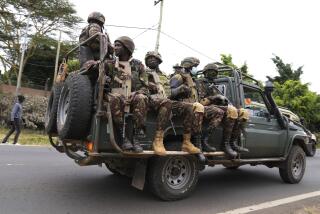Kenya Police Break Up Opposition Vigil : Africa: Signs mount that the experiment in multi-party democracy is deteriorating into partisan violence.
- Share via
NAIROBI, Kenya — Riot police tear-gassed a group of five elderly mothers of alleged political prisoners and hundreds of their sympathizers Tuesday in the latest attack on Kenya’s fledgling opposition.
The move cleared the protesters from a downtown park where they had gathered two days ago to stage a hunger strike to protest political detentions. Their vigil had attracted thousands of supporters as well as leaders of Kenya’s recently legalized opposition parties.
It came as other signs mounted that Kenya’s experiment in multi-party democracy is deteriorating into partisan violence, some of it condoned and possibly instigated by the regime of President Daniel Arap Moi, according to Kenyan observers and foreign diplomats.
In three separate incidents in the last two weeks, mobs of youths identifying themselves as supporters of KANU, the president’s party, have attacked opposition leaders trying to open recruitment offices in major provincial centers.
The most serious attack occurred Feb. 19 in the town of Ngong, the parliamentary seat of Vice President George Saitoti. In that attack, a mob ambushed an 11-car convoy of leaders of the Forum to Re-establish Democracy, the most important opposition party. As many as 11 of its officials were injured.
In several other cases, police have physically prevented the opposition party’s officials from ceremonially opening provincial or district offices. Leaders of the Kenya African National Union, or KANU, have also tried to declare large swaths of the country off-limits to the Forum to Re-establish Democracy and others in the opposition.
The attacks have not been linked directly to Moi or other leaders of his ruling KANU party thus far. But many people here fault Moi for condoning, if not encouraging, an atmosphere of political intolerance.
“To me, the government’s action since multi-party politics was authorized has not been helpful,” said a senior U.S. Embassy officer. “Declaring ‘KANU zones’ makes a travesty of multi-party politics, and this business of not allowing parties to open their premises is unacceptable.”
He said he and other diplomats fear “an escalating cycle of violence. . . . Something serious, like somebody important getting killed, could really blow the roof off the situation.”
Moi waited four days after the Ngong incident before making a public statement on the case. At that point, he digressed during a Sunday church sermon to ask KANU leaders “to conduct yourselves in a responsible manner and avoid antagonizing those in the opposition.” But two days later, he accused the opposition of plotting to assassinate Cabinet ministers and termed them “interested only in provoking a civil war.”
In response, the opposition contended that the government itself had instigated the mob attacks. “This is organized political thuggery aimed at proving President Moi’s stated fear that pluralism would only bring about chaos,” said Oginga Odinga, 82, the political leader likely to be the Forum party’s presidential candidate against Moi.
The situation here could be a serious setback in the move toward democracy in what has been East Africa’s most stable and potentially prosperous state. It is also almost certain to further sour foreign donors on Moi’s regime, now under a six-month suspension of foreign aid from the World Bank and other Western donors. They acted in response to increasing political repression, corruption and economic misbehavior by Moi’s regime.
The autocratic Moi ended KANU’s legal monopoly of Kenyan politics in December after foreign donors suspended new aid.
Opposition parties were legalized for the first time since 1982, and plans were made to amend the electoral code to accommodate what would be only the second multi-party parliamentary election in Kenya’s 28 years of independence. A date for the election, once expected for September, has not been announced; many now believe it will not be held until 1993.
Moi, for a brief period, seemed to accommodate political dissent, most notably in January by allowing the Forum party to hold its first legal rally ever. But since then, the regime has redoubled its attacks.
More to Read
Sign up for Essential California
The most important California stories and recommendations in your inbox every morning.
You may occasionally receive promotional content from the Los Angeles Times.













